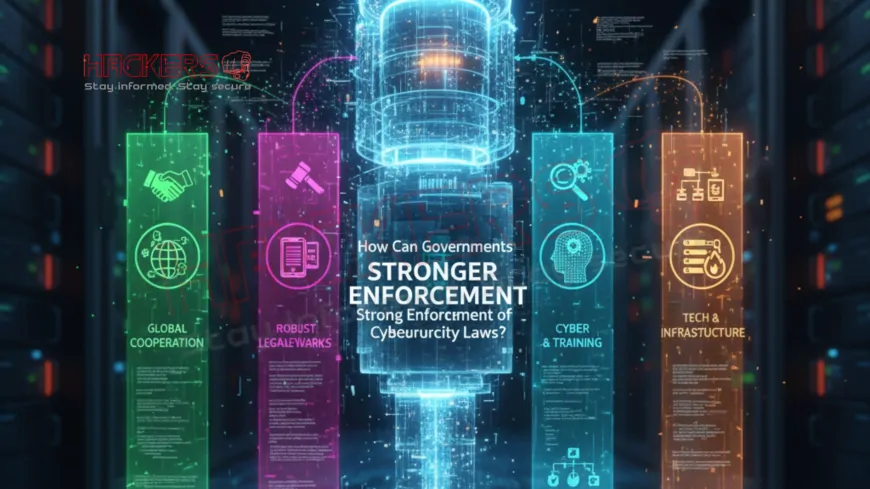How Can Governments Ensure Strong Enforcement of Cybersecurity Laws?
Imagine a world where a single click from a distant hacker could plunge an entire city's power grid into darkness, or where sensitive government data leaks expose national secrets to adversaries. As we step into late 2025, these aren't scenes from a sci-fi thriller they're real risks amplified by the escalating cyber threats facing our interconnected society. With global cybercrime costs projected to exceed $10 trillion this year, governments worldwide are racing to enforce cybersecurity laws that protect citizens, businesses, and critical infrastructure. But enforcement isn't just about passing laws; it's about making them work effectively in a landscape where threats evolve daily. From building specialized agencies to fostering international partnerships, governments have a toolkit at their disposal to strengthen enforcement. In this blog, we'll explore practical strategies for robust enforcement, explained in simple terms so even those new to cybersecurity can follow along. By understanding these approaches, we can appreciate how governments can turn paper policies into powerful defenses against digital dangers.

Table of Contents
- Understanding Cybersecurity Laws
- The Importance of Strong Enforcement
- Developing Robust Legal Frameworks
- Building Institutional Capacity
- Training and Education for Law Enforcement
- Fostering Public-Private Partnerships
- Promoting International Cooperation
- Investing in Technology and Monitoring
- Addressing Key Challenges
- Table of Government Enforcement Strategies
- Conclusion
- Frequently Asked Questions
Understanding Cybersecurity Laws
Cybersecurity laws are the rules governments create to protect digital spaces from threats like hacking, data breaches, and online fraud. These laws define what counts as a cybercrime, set penalties for offenders, and outline responsibilities for organizations and individuals. For example, in the United States, laws like the Cybersecurity Act of 2015 empower agencies to share threat information, while the EU's NIS2 Directive requires critical sectors to report incidents promptly.
At their core, these laws aim to safeguard confidentiality (keeping data private), integrity (ensuring data isn't altered), and availability (making sure systems are up and running). But passing a law is only the first step enforcement turns these ideals into reality. Without it, laws are like speed limits without police: ignored and ineffective.
Globally, frameworks vary. Some countries, like those in the EU, have harmonized approaches, while others, particularly in developing regions, are still building basic protections. Understanding this foundation helps us see why enforcement strategies must be tailored yet comprehensive.
- Define cybercrimes and penalties clearly.
- Require incident reporting and data protection.
- Promote information sharing among stakeholders.
For beginners, think of cybersecurity laws as the guardrails on a digital highway—they guide safe behavior but need enforcers to keep traffic flowing smoothly.
The Importance of Strong Enforcement
Why bother with enforcement? Simply put, weak enforcement invites chaos. In 2025, cyberattacks on government agencies alone have surged, with incidents like ransomware hitting public services and disrupting lives. Strong enforcement deters criminals by showing consequences, such as fines or jail time, are real and swift.
It also builds trust. When governments demonstrate they can protect data, citizens and businesses feel safer engaging online, boosting economies. Moreover, effective enforcement helps contain threats before they spread, like quarantining a virus.
Without it, gaps widen: Criminals exploit weak spots, and victims suffer without recourse. Enforcement bridges policy and practice, ensuring laws evolve with threats like AI exploitation or supply chain vulnerabilities.
- Deters potential cybercriminals through visible consequences.
- Builds public trust in digital systems.
- Prevents escalation of minor incidents into major crises.
In essence, strong enforcement is the muscle behind the law's brain, making abstract rules tangible protections.
Developing Robust Legal Frameworks
To enforce effectively, governments must start with solid laws. This means creating comprehensive frameworks that cover emerging threats and provide clear guidelines. For instance, updating laws to include AI-specific risks, like deepfake manipulation, ensures relevance.
Key elements include mandatory reporting: Laws should require organizations to notify authorities of breaches within hours, as in the U.S. SEC rules. Penalties must be proportional hefty fines for corporations, criminal charges for individuals—to motivate compliance.
Governments can draw from international models, like the Budapest Convention, to harmonize with global standards. Regular reviews, perhaps annually, keep frameworks agile.
- Incorporate provisions for new technologies like AI.
- Enforce mandatory breach notifications.
- Set graduated penalties to fit the crime's severity.
- Align with international treaties for broader reach.
By building these foundations, governments create enforceable laws that stand the test of time and tech.
Building Institutional Capacity
Enforcement requires strong institutions. Governments should establish dedicated agencies, like the U.S. CISA, which coordinates responses and enforces standards across sectors. These bodies need funding to hire experts and deploy tools.
Computer Emergency Response Teams (CERTs) are vital, acting as first responders to incidents. In developing countries, international aid can help build these, as seen in UN programs.
Integration with existing law enforcement, like FBI cyber units, ensures seamless operations.
- Create specialized agencies for cyber oversight.
- Fund CERTs for rapid incident response.
- Integrate cyber units into police forces.
- Seek global aid for capacity in emerging economies.
This builds a resilient structure, turning reactive efforts into proactive defenses.
Training and Education for Law Enforcement
Law enforcement officers are on the front lines, but many lack cyber skills. Governments must invest in training programs, like those from Interpol or national academies, covering digital forensics and threat analysis.
Continuous education is key—annual workshops on new threats, such as ransomware tactics. Partnerships with universities can provide certifications.
Public awareness campaigns educate citizens, reducing vulnerabilities like phishing.
- Offer specialized cyber training for officers.
- Update curricula regularly for evolving threats.
- Collaborate with academia for certifications.
- Run public campaigns to build societal resilience.
Empowered personnel mean faster, more effective enforcement.
Fostering Public-Private Partnerships
Governments can't do it alone private sector expertise is crucial. Partnerships, like those under DHS in the U.S., share threat intel in real-time.
Incentives, such as tax breaks for compliant firms, encourage participation. Joint exercises simulate attacks, building readiness.
Regulations can mandate info sharing while protecting privacy.
- Establish intel-sharing platforms.
- Provide incentives for private compliance.
- Conduct joint simulation drills.
- Balance sharing with data protection.
These alliances multiply enforcement power, leveraging diverse resources.
Promoting International Cooperation
Cyber threats ignore borders, so cooperation is essential. Joining treaties like Budapest enables cross-border investigations. Forums like the UN facilitate global standards.
Joint operations, such as Europol's takedowns of botnets, show success. Aid to developing nations builds universal capacity.
- Ratify international cyber treaties.
- Participate in global forums for standards.
- Conduct joint enforcement operations.
- Provide assistance to less-equipped countries.
This creates a united front against borderless threats.
Investing in Technology and Monitoring
Technology is a force multiplier. Governments should invest in AI for threat detection and blockchain for secure data. Monitoring systems track compliance in real-time.
Audits and metrics evaluate effectiveness, adjusting as needed.
- Adopt AI for proactive monitoring.
- Use secure tech like encryption standards.
- Implement regular compliance audits.
- Develop metrics for enforcement success.
These investments ensure enforcement keeps pace with innovation.
Addressing Key Challenges
Enforcement isn't without hurdles. Skills shortages plague many nations, requiring global training initiatives. Regulatory variations complicate international efforts. Privacy concerns must balance with security needs.
Geopolitical tensions hinder cooperation, but diplomacy can help. For more on global challenges, see Webasha's analysis.
- Combat skills gaps with education programs.
- Harmonize regulations internationally.
- Protect privacy in enforcement actions.
- Overcome geopolitics through dialogue.
By tackling these, governments can enhance enforcement resilience.
Table of Government Enforcement Strategies
| Country/Region | Strategy | Example Agency/Law |
|---|---|---|
| USA | Federal coordination and partnerships | CISA, Cybersecurity Act |
| EU | Harmonized directives and reporting | NIS2 Directive, ENISA |
| Australia | Integrated intelligence and response | ACSC |
| India | Advisories and drills | CERT-In, IT Act |
| Global | Treaty-based cooperation | Budapest Convention |
Conclusion
To conclude, governments can ensure strong enforcement of cybersecurity laws through a multifaceted approach: robust frameworks, institutional building, training, partnerships, international cooperation, tech investments, and addressing challenges. By implementing these strategies, they can deter threats, protect citizens, and foster a secure digital economy. As cyber risks evolve in 2025, proactive enforcement is not optional it's essential.
Frequently Asked Questions
What are cybersecurity laws?
They are regulations that define cybercrimes and set standards for protecting digital systems and data.
Why is enforcement important?
It deters criminals, builds trust, and prevents threats from escalating.
How can laws be made robust?
By including provisions for new tech, mandatory reporting, and proportional penalties.
What is institutional capacity?
It's creating agencies like CERTs to handle cyber incidents effectively.
Why train law enforcement?
To equip them with skills for digital forensics and threat response.
What are public-private partnerships?
Collaborations where governments and businesses share intel and resources.
How does international cooperation help?
It enables cross-border investigations and unified standards.
What tech investments are needed?
AI for detection, monitoring systems, and secure tools like encryption.
What challenges exist?
Skills shortages, regulatory variations, privacy concerns, and geopolitics.
Is CISA an example agency?
Yes, the U.S. Cybersecurity and Infrastructure Security Agency coordinates enforcement.
What is NIS2 Directive?
An EU law requiring incident reporting and security measures in critical sectors.
How do partnerships incentivize?
Through tax breaks or recognition for compliant companies.
What is the Budapest Convention?
An international treaty for cybercrime cooperation.
Why monitor enforcement?
To evaluate effectiveness and make adjustments.
Can individuals contribute?
By following best practices and reporting incidents.
What is digital forensics?
Investigating digital evidence from cybercrimes.
How address skills gaps?
Through global training and education programs.
Is privacy a challenge?
Yes, balancing it with security is key to avoid overreach.
What are joint exercises?
Simulations of attacks to prepare teams.
Why update laws regularly?
To cover evolving threats like AI attacks.
What's Your Reaction?










































































